Fleurs du Mal Magazine


Or see the index
Why Misread a Cloud takes its name from clouds of ash and smoke in wartime which appear to the author as a “storm, blown over the sea.”
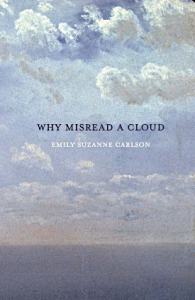 Both an exploration of the mind’s ability to turn what is into something else, in order to survive, and the mind’s ability to resist the effects of psychosocial warfare imposed by the military and the police.
Both an exploration of the mind’s ability to turn what is into something else, in order to survive, and the mind’s ability to resist the effects of psychosocial warfare imposed by the military and the police.
“Who wants you to be afraid” the poet’s friend asks as he “added sugar to his tea.” The realization this question brings enables the poet to explore forces that separate us from one another and ways we rise up within ourselves to move through fear toward love.
Emily Suzanne Carlson (she/they) is a mother, a poet, a teacher, and the director of Art in the Garden, a liberatory, anti-racist, LGBTQ+ welcoming, and joy-centered program that addresses the impacts of childhood adversity and trauma. Emily is the author of two prior collections: I Have a Teacher (Center for Book Arts 2016), and Symphony No. 2 (Argos Books, 2015). Emily earned a BA from Sarah Lawrence College and an MFA from the University of Pittsburgh. With friends, they run the Bonfire Reading Series. Emily lives with their partner and their three children in an intentional community centered around an urban garden in Pittsburgh, Pennsylvania.
Why Misread a Cloud
Emily Suzanne Carlson
Pub. Date: 10/31/2022
Publisher: Tupelo Press
ISBN: 978-1-946482-79-2
Binding: Paberback
Pages: 42
Price: $ 17.95
• fleursdumal.nl magazine
More in: #Editors Choice Archiv, - Book News, - Bookstores, Archive C-D, Archive C-D
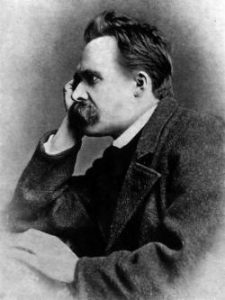
Das trunkene Lied
O Mensch! Gib acht!
Was spricht die tiefe Mitternacht?
»Ich schlief, ich Schlief -,
Aus tiefem Traum bin ich erwacht: –
Die Welt ist tief,
Und tiefer als der Tag gedacht.
Tief ist ihr weh -,
Lust – tiefer noch als Herzeleid:
weh spricht: Vergeh!
Doch alle Lust will Ewigkeit –
– Will tiefe, tiefe Ewigkeit!«
Friedrich Nietzsche
(1844 – 1900)
Das trunkene Lied
• fleursdumal.nl magazine
More in: Archive M-N, Archive M-N, Friedrich Nietzsche, Nietzsche
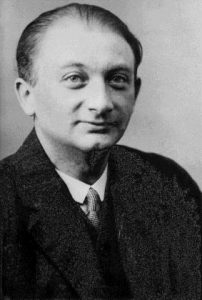
Lied der ungeborenen Kinder
Wir sind nur ein leises zartes Wehen
Ihr könnt uns nicht sehen
Wir sind nur Gedanken und leichter als Hauch
Aber wir leben auch.
Wir sind nie gewesen, wir durften nicht sein
Nur Wünsche sind wir, nicht Fleisch und nicht Bein
Eure innigsten Träume waren wir mal
Und sind jetzt Eure Qual.
Wir schweben um Euch als leichter Duft
Ihr greift nach uns und greift die Luft
Wir sind gar nicht da und Ihr könnt uns nicht fassen
Ihr müsst uns hassen.
Nur in manchen Träumen fangt Ihr uns ein,
Dann liegen wir an Euren Herzen
Und träumen lächelt Ihr der Schmerzen
Und denkt nicht der Qualen, die wir Euch gemacht,
Bis Ihr erwacht.
Joseph Roth
(1894 – 1939)
Lied der ungeborenen Kinder
• fleursdumal.nl magazine
More in: Archive Q-R, Archive Q-R, Joseph Roth
Ferdinand, le héros de Guerre, a quitté la France pour rejoindre Londres, « où viennent fatalement un jour donné se dissimuler toutes les haines et tous les accents drôles ».
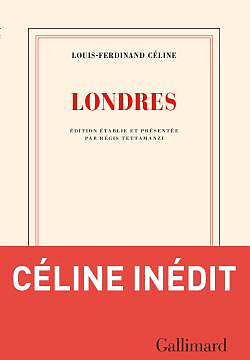 Il y retrouve son amie prostituée Angèle, désormais en ménage avec le major anglais Purcell. Ferdinand prend domicile dans une mansarde de Leicester Pension, où le dénommé Cantaloup, un maquereau de Montpellier, organise un intense trafic sexuel de filles, avec quelques autres personnages hauts en couleur, dont un policier, Bijou, et un ancien poseur de bombes, Borokrom.
Il y retrouve son amie prostituée Angèle, désormais en ménage avec le major anglais Purcell. Ferdinand prend domicile dans une mansarde de Leicester Pension, où le dénommé Cantaloup, un maquereau de Montpellier, organise un intense trafic sexuel de filles, avec quelques autres personnages hauts en couleur, dont un policier, Bijou, et un ancien poseur de bombes, Borokrom.
Proxénétisme, alcoolisme, trafic de poudre, violences et irrégularités en tout genre rendent chaque jour plus suspecte cette troupe de sursitaires déjantés, hantés par l’idée d’être envoyés ou renvoyés au front.
S’il entretient des liens avec Guignol’s band, l’autre roman anglais plus tardif de Céline, Londres, établi depuis le manuscrit récemment retrouvé, s’impose avec puissance comme le grand récit d’une double vocation : celle de la médecine et de l’écriture… Ou comment se tenir au plus près de la vérité des hommes, plongé dans cette farce outrancière et mensongère qu’est la vie.
Louis-Ferdinand Céline
Né en 1894 à Courbevoie, près de Paris, Louis-Ferdinand Céline (pseudonyme de L.-F. Destouches) prépare seul son baccalauréat tout en travaillant. Engagé en 1912, il est gravement blessé en novembre 1914. Invalide à 75 % et réformé, il devient agent commercial et part au Cameroun (1916), puis à Londres (1917).
Après la Victoire, il fait des études de médecine, puis accomplit des missions en Afrique et aux États-Unis pour le compte de la Société des Nations. De retour en France, il exerce la médecine dans la banlieue parisienne et publie en 1932 son premier ouvrage Voyage au bout de la nuit, suivi, en 1936, de Mort à crédit.
De 1944 à 1951, Céline, exilé, vit en Allemagne et au Danemark. Revenu en France, il s’installe à Meudon où il poursuit son œuvre (D’un château l’autre, Nord, Rigodon) et continue à soigner essentiellement les pauvres. Il meurt en 1961.
Louis-Ferdinand Céline
Londres
Édition de Regis Tettamanzi
Collection Blanche, Gallimard
Parution : 13-10-2022
576 pages
Grand format: 140 x 205 mm
Littérature française
Époque : XXe siècle
ISBN : 9782072983375
Gencode : 9782072983375
Code distributeur : G06460
€ 24.00
• fleursdumal.nl magazine
More in: - Book News, - Bookstores, Archive C-D, Louis-Ferdinand Céline
Parmi les manuscrits de Louis-Ferdinand Céline récemment retrouvés figurait une liasse de deux cent cinquante feuillets révélant un roman dont l’action se situe dans les Flandres durant la Grande Guerre.
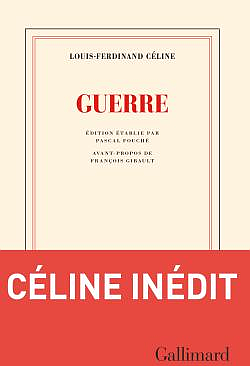 Avec la transcription de ce manuscrit de premier jet, écrit quelque deux ans après la parution de Voyage au bout de la nuit (1932), une pièce capitale de l’œuvre de l’écrivain est mise au jour. Car Céline, entre récit autobiographique et œuvre d’imagination, y lève le voile sur l’expérience centrale de son existence : le traumatisme physique et moral du front, dans l’« abattoir international en folie ».
Avec la transcription de ce manuscrit de premier jet, écrit quelque deux ans après la parution de Voyage au bout de la nuit (1932), une pièce capitale de l’œuvre de l’écrivain est mise au jour. Car Céline, entre récit autobiographique et œuvre d’imagination, y lève le voile sur l’expérience centrale de son existence : le traumatisme physique et moral du front, dans l’« abattoir international en folie ».
On y suit la convalescence du brigadier Ferdinand depuis le moment où, gravement blessé, il reprend conscience sur le champ de bataille jusqu’à son départ pour Londres. À l’hôpital de Peurdu-sur-la-lys, objet de toutes les attentions d’une infirmière entreprenante, Ferdinand, s’étant lié d’amitié au souteneur Bébert, trompe la mort et s’affranchit du destin qui lui était jusqu’alors promis.
Ce temps brutal de la désillusion et de la prise de conscience, que l’auteur n’avait jamais abordé sous la forme d’un récit littéraire autonome, apparaît ici dans sa lumière la plus crue. Vingt ans après 14, le passé, « toujours saoul d’oubli », prend des « petites mélodies en route qu’on lui demandait pas ». Mais il reste vivant, à jamais inoubliable, et Guerre en témoigne tout autant que la suite de l’œuvre de Céline.
Louis-Ferdinand Céline
Né en 1894 à Courbevoie, près de Paris, Louis-Ferdinand Céline (pseudonyme de L.-F. Destouches) prépare seul son baccalauréat tout en travaillant. Engagé en 1912, il est gravement blessé en novembre 1914. Invalide à 75 % et réformé, il devient agent commercial et part au Cameroun (1916), puis à Londres (1917).
Après la Victoire, il fait des études de médecine, puis accomplit des missions en Afrique et aux États-Unis pour le compte de la Société des Nations. De retour en France, il exerce la médecine dans la banlieue parisienne et publie en 1932 son premier ouvrage Voyage au bout de la nuit, suivi, en 1936, de Mort à crédit.
De 1944 à 1951, Céline, exilé, vit en Allemagne et au Danemark. Revenu en France, il s’installe à Meudon où il poursuit son œuvre (D’un château l’autre, Nord, Rigodon) et continue à soigner essentiellement les pauvres. Il meurt en 1961.
Louis-Ferdinand Céline
Guerre
Édition de Pascal Fouché.
Avant-propos de François Gibault
Collection Blanche, Gallimard
Parution : 05-05-2022
192 pages
ill.
140 x 205 mm
Littérature française
Époque: XXe siècle
ISBN: 9782072983221
Gencode: 9782072983221
Code distributeur: G06457
€ 19,00
• fleursdumal.nl magazine
More in: - Book News, - Bookstores, Archive C-D, Louis-Ferdinand Céline

Vereinsamt
I. Die Krähen schrei’n
Die Krähen schrein
Und ziehen schwirren Flugs zur Stadt:
Bald wird es schnein. –
Wohl dem, der jetzt noch Heimat hat!
Nun stehst du starr,
Schaust rückwärts, ach! wie lange schon!
Was bist Du Narr
Vor Winters in die Welt entflohn?
Die Welt – ein Tor
Zu tausend Wüsten stumm und kalt!
Wer das verlor,
Was du verlorst, macht nirgends halt.
Nun stehst du bleich,
Zur Winter-Wanderschaft verflucht,
Dem Rauche gleich,
Der stets nach kältern Himmeln sucht.
Flieg, Vogel, schnarr
Dein Lied im Wüstenvogel-Ton! –
Versteck, du Narr,
Dein blutend Herz in Eis und Hohn!
Die Krähen schrein
Und ziehen schwirren Flugs zur Stadt:
Bald wird es schnein. –
Weh dem, der keine Heimat hat.
II. Antwort
Daß Gott erbarm’!
Der meint, ich sehnte mich zurück
In’s deutsche Warm.
In’s dumpfe deutsche Stuben-Glück!
Mein Freund, was hier
Mich hemmt und und hält, ist dein Verstand,
Mitleid mit dir!
Mitleid mit deutschem Quer-Verstand!
Friedrich Nietzsche
(1844 – 1900)
Vereinsamt
• fleursdumal.nl magazine
More in: Archive M-N, Archive M-N, Friedrich Nietzsche, Nietzsche
A tender and compellling memoir of the author’s grandparents, their literary salon, and a way of life that is no more.
The House of Twenty Thousand Books is the story of Chimen Abramsky, an extraordinary polymath and bibliophile who amassed a vast collection of socialist literature and Jewish history. For more than fifty years Chimen and his wife, Miriam, hosted epic gatherings in their house of books that brought together many of the age’s greatest thinkers.
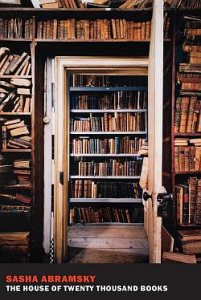 The atheist son of one of the century’s most important rabbis, Chimen was born in 1916 near Minsk, spent his early teenage years in Moscow while his father served time in a Siberian labor camp for religious proselytizing, and then immigrated to London, where he discovered the writings of Karl Marx and became involved in left-wing politics.
The atheist son of one of the century’s most important rabbis, Chimen was born in 1916 near Minsk, spent his early teenage years in Moscow while his father served time in a Siberian labor camp for religious proselytizing, and then immigrated to London, where he discovered the writings of Karl Marx and became involved in left-wing politics.
He briefly attended the newly established Hebrew University in Jerusalem, until World War II interrupted his studies.
Back in England, he married, and for many years he and Miriam ran a respected Jewish bookshop in London’s East End. When the Nazis invaded Russia in June 1941, Chimen joined the Communist Party, becoming a leading figure in the party’s National Jewish Committee. He remained a member until 1958, when, shockingly late in the day, he finally acknowledged the atrocities committed by Stalin. In middle age, Chimen reinvented himself once more, this time as a liberal thinker, humanist, professor, and manuscripts’ expert for Sotheby’s auction house.
Journalist Sasha Abramsky re-creates here a lost world, bringing to life the people, the books, and the ideas that filled his grandparents’ house, from gatherings that included Eric Hobsbawm and Isaiah Berlin to books with Marx’s handwritten notes, William Morris manuscripts and woodcuts, an early sixteenth-century Bomberg Bible, and a first edition of Descartes’s Meditations. The House of Twenty Thousand Books is a wondrous journey through our times, from the vanished worlds of Eastern European Jewry to the cacophonous politics of modernity.
The Book includes 43 photos.
“Sasha Abramsky’s account of his grandfather’s devotion to books and reading is a moving testimonial to the persistance of human curiosity in a world that seems to drift farther and farther from the delight of intellectual pursuits. It is a moving, instructive, astonishing account of one man’s love for the printed word that all readers will appreciate. The House of Twenty Thousand Books deserves twenty hundred thousand readers.”
— Alberto Manguel
Sasha Abramsky was born and raised in the UK, studied politics, philosophy and economics at Balliol College, Oxford, and moved to the US in my early 20s. He has lived and worked in London, New York, and in California. His writings have been published in the Nation magazine, the New Yorker online, the New York Times, Atlantic, Mother Jones, Truthout, Sacramento Magazine, Slate, Salon, and many other publications in the US. In the UK he has written for a number of publications, including the Guardian, the Observer, the Sunday Telegraph, and the New Statesman.
The House of Twenty Thousand Books
by Sasha Abramsky, with a new preface by the author
Publisher: New York Review Books
Reprint edition 2017
Language: English
Paperback
376 pages
ISBN-10: 1681371138
ISBN-13: 978-1681371139
$17.95
• fleursdumal.nl magazine
More in: #Biography Archives, - Book Lovers, - Book Stories, Alberto Manguel, Archive A-B, Libraries in Literature, Literaire sporen, The Art of Reading
“Some girls are not made,” torrin a. greathouse writes, “but spring from the dirt.”
 Guided by a devastatingly precise hand, Wound from the Mouth of a Wound—selected by Aimee Nezhukumatathil as the winner of the 2020 Ballard Spahr Prize for Poetry—challenges a canon that decides what shades of beauty deserve to live in a poem. greathouse celebrates “buckteeth & ulcer.”
Guided by a devastatingly precise hand, Wound from the Mouth of a Wound—selected by Aimee Nezhukumatathil as the winner of the 2020 Ballard Spahr Prize for Poetry—challenges a canon that decides what shades of beauty deserve to live in a poem. greathouse celebrates “buckteeth & ulcer.”
She odes the pulp of a bedsore. She argues that the vestigial is not devoid of meaning, and in kinetic and vigorous language, she honors bodies the world too often wants dead.
These poems ache, but they do not surrender. They bleed, but they spit the blood in our eyes. Their imagery pulses on the page, fractal and fluid, blooming in a medley of forms: broken essays, haibun born of erasure, a sonnet meant to be read in the mirror. greathouse’s poetry demands more of language and those who wield it. “I’m still learning not to let a stranger speak / me into a funeral.”
Concrete and evocative, Wound from the Mouth of a Wound is a testament to persistence, even when the body is not allowed to thrive. greathouse—elegant, vicious, “a one-girl armageddon” draped in crushed velvet—teaches us that fragility is not synonymous with flaw.
torrin a. greathouse is a transgender cripple-punk poet and essayist. Her work is published in POETRY, Ploughshares, and The Kenyon Review. She is a 2021 NEA Literature Fellow. Their debut collection Wound from the Mouth of a Wound (Milkweed Editions, 2020), was the winner of the 2022 Kate Tufts Discovery Award. She teaches at the Rainier Writing Workshop, the low-residency MFA program at Pacific Lutheran University.
Wound from the Mouth of a Wound
Poems
By torrin a. greathouse
Paperback
Publisher: Milkweed Editions
Language: English
Paperback: 88 pages
ISBN-10: 1571315276
ISBN-13: 978-1571315274
Publish. Date: 12/22/2020
$16.00
• fleursdumal.nl magazine
More in: #Editors Choice Archiv, - Book News, - Bookstores, Archive G-H, Archive G-H
A comprehensive overview of Richard Long’s career, selected by the artist himself and encompassing his artworks from the 1960s to today.

Richard Long has been at the forefront of land art for more than half a century. A pioneer of conceptual practices in the 1960s, Long takes sculpture out of the studio into nature and around the world, using time, space, distance, navigation, perception, the elements, and the geological forces that have shaped the landscape as both his tools and his vocabulary.
Many Rivers to Cross is a personal overview of Richard Long’s career, including works selected by the artist and spanning the late 1960s to the present day. It covers his practice in all its forms: walks, photographs, text works, large installations, mud works, and drawings, including some early unpublished works as well as many seminal and celebrated projects.
A number of short backstories written by Long not only provide insight into the context and making of key works, but also evoke the sense of freedom and adventure of an epic journey across foreign landscapes. Texts include a recent conversation between Long and internationally acclaimed composer and musician Nitin Sawhney; a dialogue about the recreation of Muddy Water Circle at Frieze Masters in London with Lisson Gallery; and a discussion with curator Alkistis Dimaki on the occasion of the presentation of Athens Slate Line at the Acropolis, Athens. The book also includes documentation of works presented internationally in museums and galleries.
Sir Richard Long, CBE, is one of Britain’s foremost sculptors and land artists. Short-listed four times for the Turner Prize, he won the award in 1989 for White Water Line. He was elected to the Royal Academy of Arts in 2001 and for more than fifty years his work has been exhibited at major galleries throughout the world. Richard Long lives and works in Bristol, the city in which he was born.
Many Rivers to Cross
by Richard Long (Author)
Publisher : Thames & Hudson
June 21, 2022
Language: English
Hardcover: 424 pages
ISBN-10 : 050097120X
ISBN-13 : 978-0500971208
$70.00
• fleursdumal.nl magazine
More in: - Book News, Archive K-L, Art & Literature News, Land Art, Richard Long, Sculpture
Winner of the 2022 Publish Triangle Trans and Gender-Variant Literature Award. Finalist for the 2021 Northern California Book Award in Poetry.
A thrilling, discursive second collection from “a poet for this hour—bewildered, hopeful, and cracklingly alive” (Mark Doty).
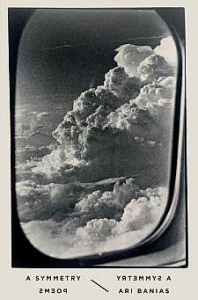 The poems in Ari Banias’s thrilling and discursive second collection, A Symmetry, unsettle the myth of a benevolently ordered reality. Through uncanny repetitions and elliptical inquiry, Banias contends with the inscriptions of nationhood, language, and ancestral memory in the architectures of daily experience.
The poems in Ari Banias’s thrilling and discursive second collection, A Symmetry, unsettle the myth of a benevolently ordered reality. Through uncanny repetitions and elliptical inquiry, Banias contends with the inscriptions of nationhood, language, and ancestral memory in the architectures of daily experience.
Refusing the nostalgias of classicism and the trap of authenticity, these poems turn instead to a Greece of garbage strikes and throwaway tourist pleasures, where bad gender means bad grammar, and a California coast where mansions offer themselves to be crushed under your thumb.
A piece of citrus hurled into one poem’s apartment window rolls downhill and escapes the narrative altogether in another. Farmers destroy their own olive trees, strangers mesmerize us as they fold sheets into perfect corners, “artists who design border wall prototypes are artists / who say they “leave politics out of it.’” Climate collapse and debt accelerate, and desire transforms itself in the ruins.
From within psychic interiors and iconic sites—the museum, the strip mall, the discotheque, the sea—A Symmetry attends to the intimate, social proportions of our material world and discerns the simmering potential of a present that “can be some other way. And is.”
Ari Banias is the author of Anybody, a finalist for the Kate Tufts Discovery Award and the PEN Center USA Award for Poetry. His poems have appeared in the Kenyon Review, Poetry, and the Nation, among other publications. He lives in Oakland, California.
Ari Banias:
A Symmetry
Poems
October 2021
Publishers: W. W. Norton & Company
ISBN: 978-0-393-86813-5
112 pages
Hardcover
$26.95
• fleursdumal.nl magazine
More in: #Editors Choice Archiv, - Book News, Archive A-B, Archive A-B
Die Erzählfigur in ›Blutbuch‹ identifiziert sich weder als Mann noch als Frau.
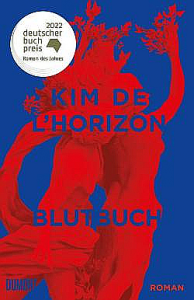 Aufgewachsen in einem schäbigen Schweizer Vorort, lebt sie mittlerweile in Zürich, ist den engen Strukturen der Herkunft entkommen und fühlt sich im nonbinären Körper und in der eigenen Sexualität wohl.
Aufgewachsen in einem schäbigen Schweizer Vorort, lebt sie mittlerweile in Zürich, ist den engen Strukturen der Herkunft entkommen und fühlt sich im nonbinären Körper und in der eigenen Sexualität wohl.
Doch dann erkrankt die Großmutter an Demenz, und das Ich beginnt, sich mit der Vergangenheit auseinanderzusetzen: Warum sind da nur bruchstückhafte Erinnerungen an die eigene Kindheit? Wieso vermag sich die Großmutter kaum von ihrer früh verstorbenen Schwester abzugrenzen?
Und was geschah mit der Großtante, die als junge Frau verschwand? Die Erzählfigur stemmt sich gegen die Schweigekultur der Mütter und forscht nach der nicht tradierten weiblichen Blutslinie.
Dieser Roman ist ein stilistisch und formal einzigartiger Befreiungsakt von den Dingen, die wir ungefragt weitertragen: Geschlechter, Traumata, Klassenzugehörigkeiten.
Kim de l’Horizon macht sich auf die Suche nach anderen Arten von Wissen und Überlieferung, Erzählen und Ichwerdung, unterspült dabei die linearen Formen der Familienerzählung und nähert sich einer flüssigen und strömenden Art des Schreibens, die nicht festlegt, sondern öffnet.
Kim de l’Horizon, geboren 2666 auf Gethen. In der Spielzeit 21/22 war Kim Hausautor an den Bühnen Bern. Vor dem Debüt ›Blutbuch‹ versuchte Kim mit Nachwuchspreisen attention zu erringen – u. a. mit dem Textstreich-Wettbewerb für ungeschriebene Lyrik, dem Treibhaus-Wettkampf für exotische Gewächse und dem Damenprozessor. Heute hat Kim aber genug vom »ICH«, studiert Hexerei bei Starhawk, Transdisziplinarität an der ZHdK und textet kollektiv im Magazin DELIRIUM. ›Blutbuch‹ wurde mit dem Literaturpreis der Jürgen Ponto-Stiftung ausgezeichnet und ist nominiert für den Deutschen Buchpreis 2022.
Ausgezeichnet mit dem Deutschen Buchpreis 2022
Blutbuch
Kim de l’Horizon
Roman
336 Seiten
DuMont Buchverlag
Erscheinungstag: 19.07.2022
ISBN 978-3-8321-8260-1
Gebunden
€ 24,00
• fleursdumal.nl magazine
More in: - Book News, - Bookstores, Archive G-H, Awards & Prizes
The Seven Moons of Maali Almeida was announced as the winner of the Booker Prize 2022 on October 17 at a ceremony in London.
Shehan Karunatilaka’s second novel is a searing, mordantly funny satire set amid the murderous mayhem of a Sri Lanka beset by civil war.
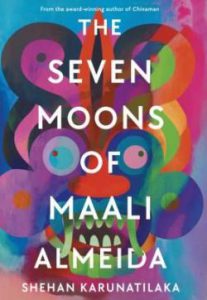 Maali Almeida, war photographer, gambler and closet gay, has woken up dead in what seems to be a celestial visa office. His dismembered body is sinking in the Beira Lake and he has no idea who killed him. At a time when scores are settled by death squads, suicide bombers and hired goons, the list of suspects is depressingly long.
Maali Almeida, war photographer, gambler and closet gay, has woken up dead in what seems to be a celestial visa office. His dismembered body is sinking in the Beira Lake and he has no idea who killed him. At a time when scores are settled by death squads, suicide bombers and hired goons, the list of suspects is depressingly long.
But even in the afterlife, time is running out for Maali. He has ‘seven moons’ to try and contact the man and woman he loves most and lead them to a hidden cache of photos that will rock Sri Lanka.
“Life after death in Sri Lanka: an afterlife noir, with nods to Dante and Buddha and yet unpretentious. Fizzes with energy, imagery and ideas against a broad, surreal vision of the Sri Lankan civil wars. Slyly, angrily comic.”
— The 2022 judges Booker Prize on The Seven Moons of Maali Almeida
• fleursdumal.nl magazine
More in: - Book News, - Bookstores, Archive K-L, Awards & Prizes
Thank you for reading Fleurs du Mal - magazine for art & literature